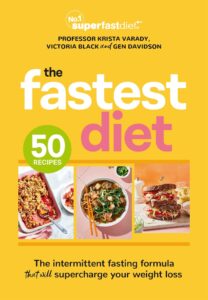 Article extracted from The Fastest Diet by Professor Krista Varady, Victoria Black, Gen Davidson, Macmillan Publishers, RRP $44.99
Article extracted from The Fastest Diet by Professor Krista Varady, Victoria Black, Gen Davidson, Macmillan Publishers, RRP $44.99
As much as we’d love to take credit for inventing intermittent fasting (IF), we can’t. It’s actually as old as the hills – well, the cave-dwellers in them at any rate. Fasting has been around since Ms Trog accidentally dropped a hunk of meat into the fire and the practice of eating after a good hunting/gathering expedition is firmly embedded in our DNA.
Our bodies were trained for tens of thousands of years to adjust to periods of feasting when we found food, and periods of fasting when we had to sit around and draw paintings on the wall while we went without. We’re built to feast and we’re built to fast. It was quite literally just ‘life’ for the Trog family.
It’s an ancient religious practice, too. Many of the world’s oldest religions have observed (or still observe) the practice of fasting for spiritual reasons. If you grew up Catholic like Gen, you might remember those tummy rumbles before Mass or during Lent.
Fast forward to the present day. Many modern humans can eat whatever, whenever, thanks to refrigeration, supermarkets and restaurants. Gone are the days when you had to pick up your club and brave the unknowns of the scary jungle. These days our scary jungles consist of crowded carparks and neon-lit supermarkets, with everything your taste buds could possibly want, tantalisingly on display. You don’t even have to brave the crowds, in fact. You can choose not to leave the couch at all and have a full meal delivered straight to your door. This means we can eat all … the … time. And many people do (us included, once upon a time).
The downside to all that ease of access is how easily it can lead to weight gain and the issues that come with it. The latest data from the Australian Bureau of Statistics (ABS) show that 67 per cent of adults are overweight or obese. Our ancestors may well have battled for their mammoth meal but at least they didn’t have to battle obesity. There is good news for us modern humans, however, because we don’t have to reinvent the diet wheel. We can simply replicate the Trogs’ fast/feast lifestyle with IF.
Um, so what actually is intermittent fasting?
Scientifically, the definition of IF is exactly as it sounds: intermittent periods of eating, interspersed with intermittent periods of not eating, or eating less. It’s a behavioural approach to weight loss that works with the idea of ‘delaying’ food consumption rather than ‘denying’ it. In a nutshell, it is essentially a ‘reward cycle’ of eating (we told you it was fun – who doesn’t love being rewarded?!). For example, you might skip a meal or reduce calorie consumption for a while, but then you can fully enjoy a well-earned, hearty meal as your reward. Normal eating – delayed. Compare this with traditional calorie restriction diets when you’re on a set number of calories for an extended period with no big pay-off rewards in sight. Normal eating – denied. Totally different mindset, right?
I have been with SuperFastDiet (SFD) for over two years and have lost 20 kg, which I have maintained within a 2 kg range. Normally, when on a ‘diet’ I would regain all of the kilos along with a few extras as well. A conventional diet has a beginning and an end, but SFD is a lifestyle and you live it each day, which is the major difference. Another important thing to me is the SFD community itself, something that has always been a missing factor in my life. If I’m having a bad day, I just reach out and someone will be there to support me, as we are all on the same journey and are here to help each other. For anybody who has been on the diet treadmill like I have been, all I can say is give SFD a try. It worked for me and I was 60 when I began my journey. DONNA BLACK
This ‘reward yourself’ point of difference is one of the keys to fasting success. It’s much easier to stick to the diet because you regularly get to ‘break’ it when you end your fast, so it doesn’t really seem like a diet at all. It’s almost like you’re cheating – even though you’re not. (Although it does feel a bit naughty. Which we like.)
There are also health benefits to delaying eating, as your body actually gets to hop into a ‘fasted’ state. Think of IF like a boogie-nights dancefloor. You may well be a dancing queen, shaking your booty with the best of them, but sooner or later you literally need to cool your heels and take a break. Your body is the same. You could eat whatever you like at all times, but to achieve optimum health and weight, your body actually needs a break from eating so it’s rested and ready to chow down in funky food town.
The flexy factor
Decide which days to fast in advance & plan according to your actual week – simple as that!
IF is an umbrella term for a whole bunch of different methods or approaches. In the health-o-sphere, there are lots of terms to describe fasting. You might recognise ‘The Warrior Diet’ (eating for only four hours a day), ‘OMAD’ or ‘One Meal a Day’, or ‘The 24-hour Fast’, which is pretty much the same as OMAD. We’ve tried them all and narrowed our favourite methods to start with down to the 2-day (5:2), 3-day (4:3), part-day (16:8) and now ‘supercharging’ (more on that exciting new method in a sec!) as these are the ones that we’ve found the cinchiest to maintain.
The flexy factor comes into play with all of our methods. If you choose the 2-day, 3-day or supercharge methods, you can decide which days to fast in advance. A nice hack is to plan your fasting week according to your actual week. So, if you know you have something social scheduled for what is usually a fast day, you just move it to another day so you can go out and enjoy. Note: if you change your mind at the last minute because your BFF brought over a pizza, that’s okay too. You can just move the fast day again. #winningwithcheeseontop
If you choose the part-day method, you’re allowed to have an eating ‘window’ of about eight hours each day. Your chosen window can be anytime you like. If you’re a big-time breakfast lover, you can shift your window and have an early dinner instead. If you’re happy to skip breakfast, it’s really just a normal day’s eating otherwise. Plenty of our members have lost significant amounts of weight simply by becoming ‘breakfast-skippers’.
And … You can also change your method if you feel like you want to amp it up after reaching a goal.
And … You can take it to the next level with a ‘clean fast’ or make it foolproof with a ‘dirty fast’ (more on that cheeky practice on page 57).
And … You can also hit reset after you’ve overindulged/been on holidays/ had a huge social weekend by supercharging.
In fact, there are so many IF tools you can pack in your kit, you’ll feel like a superhero with an invisible fasting utility belt at your fingertips. It’s not a static, unchangeable boring old diet with one set of rules. It’s an adaptable way of eating that gives you diet superpowers you can access at any given time. #flexyfactor
I’ve been doing the SFD for six months now and have lost 7.8 kg. I’ve been a bit relaxed the last month as I had a house guest for two weeks – a little takeaway here, a little snacking there – and I still lost 2 kg … I’ve needed to have a bra hook extender with my bras for years … I have been able to take it out and am now on the last row of three hooks! I can also wear rings that I haven’t been able to fit on my fingers for a very long time! NICOLE HAND
Intermittent fasting is a whole-body experience!
Prior to Dr Krista’s latest research, this is everything we knew about the health benefits of fasting:
Fasting is gutsy, in that it’s good for your guts. A 2020 study found that the diversity of the gut microbiome increased by 31 per cent in participants who fasted, compared to those that didn’t. ‘Um … what’s a microbiome?’ we hear you ask. It’s a clever community of microorganisms believed to be key for gut health.
Fasting also increases ‘good’ cholesterol. A 2020 study linked this increased microbiome richness with an increase in HDL cholesterol – that’s the ‘good’ cholesterol that helps your body get rid of ‘bad’ cholesterol that can lead to heart disease and stroke.
It can improve sleep apnoea. A 2020 study on the effects of fasting on quality of sleep reported a decrease in sleep apnoea. Gen is real-life proof of this, no longer needing a machine or having to spend the night in the spare room! Participants in this study also reported no disruption to sleep patterns while they were fasting.
Belly fat decreases. Hooray! Multiple studies found a reduction in waist circumference in fasting groups, with one study reporting a median decrease of 4.6 cm after 90 days. Belly fat can be dangerous because it surrounds internal organs and can lead to health issues.
It may help prevent cancer. Multiple studies conducted since 2020 report a decrease in the hormone ‘insulin-like growth factor’ (IGF-1). In 2020, a study found that, in excess, IGF-1 may be associated with an increased risk of several cancers, including melanoma, thyroid cancer and bone marrow cancer.
It may improve quality of life. A three-month study published in 2022 had participants report a statistically significant improvement in quality of life. This was measured by questionnaires, including the World Health Organization standards, which tracked general mood, vitality, social functioning, mental health, emotional wellbeing and more. #happinessdiet
It may increase energy. The same 2022 study also found statistically significant reductions in physical and mental fatigue after three months. #energisingdiet
It may improve brain function. Researchers found that fasting can give your brain a boost by increasing the chemical ‘brain-derived neurotrophic factor’ (BDNF) that improves the connection between brain cells, hence improving brain function. #smartypantsdiet
It may decrease blood pressure. Multiple studies reported a decrease in blood pressure of between 3 and 11 per cent as a result of IF.
It may improve mood and reduce anxiety and depression. A review of studies that looked at the mental health effects of IF found that it effectively improved mood. Improvements in anxiety levels and depression in participants who fasted was also reported.
There will be weight loss. A scientific review of the part-day method reported that the most common finding in these studies was a decrease in body weight. Multiple studies also reported a decrease in body fat percentage and Body Mass Index (BMI). #weightloss=fact









Join the Discussion
Type out your comment here:
You must be logged in to post a comment.